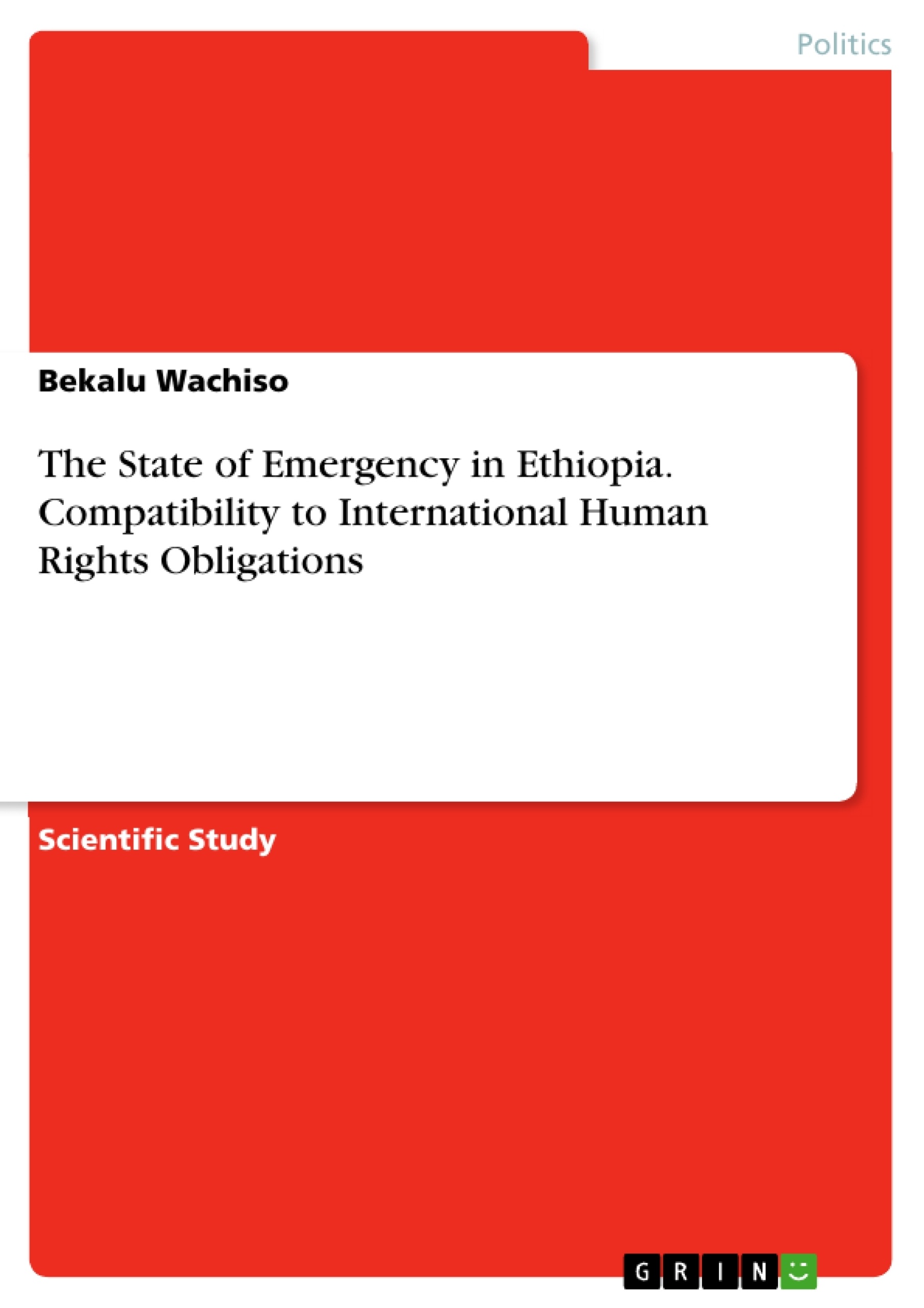This paper examines the constitutional and legal derogations or limitations to which the enjoyment of Human Rights could be subjected, during a period of a State of Emergency in Ethiopia and explores Ethiopia's compatibility to International Human rights standards.
The scope of the Research is general and broad because of which it was not possible to identify and elaborate on each and every legislation and provisions that are inconsistent with constitutional and international human rights principles and propose recommendations. For example, regarding how courts, national human right institutions and etcetera are handling domestic application of international human rights instruments is not the scope here.
The research approach for this study was qualitative one. As a matter of the fact that the issue of human rights is subtle and the lack of adequate data system of the legal system, a multi-methodology approach was deployed. Data collection tools employed is a Document analysis, qualitative interview and Literature review.
The study concludes that the declaration of emergency and the resultant derogation of human rights has been the normal form of exercise of state of sovereignty in Ethiopia. In addition to the governing norms and principles the country use as a precondition to justify the need to take emergency measures and giving power to the concerned organ, a proper institutional and procedural mechanism of checking and necessary control against a possible abuse of emergency powers is vital.
Inhaltsverzeichnis (Table of Contents)
- Abstract
- List of abbreviations
- CHAPTER ONE.
- Introduction
- Research Objectives
- General objective
- Specific Objective
- Methodology
- CHAPTER TWO.
- Review of relevant Literatures
- CHAPTER THREE.
- Finding and Discussion
- Constitutionality of state of emergency and Human Rights protection in the Ethiopian legal system
- Legal analysis of the State of emergency in Ethiopia: a compatibility checks on Ethiopia's International Human rights obligations.
- Conclusions
- Finding and Discussion
Zielsetzung und Themenschwerpunkte (Objectives and Key Themes)
This paper aims to examine the constitutional and legal derogations or limitations that can be imposed on human rights during a state of emergency in Ethiopia. It further explores Ethiopia's compliance with international human rights standards. While the scope of the research is broad and includes a general overview, it does not delve into specific legislation, provisions, or recommendations related to the domestic application of international human rights instruments.
- The constitutionality of state of emergency in relation to human rights protection in the Ethiopian legal system.
- The legal analysis of the state of emergency in Ethiopia, specifically examining its compatibility with international human rights obligations.
- The limitations and derogations to human rights that are permissible during a state of emergency.
- The role of international and regional human rights instruments in shaping Ethiopia's approach to state of emergency.
- The importance of institutional and procedural mechanisms to prevent abuse of emergency powers.
Zusammenfassung der Kapitel (Chapter Summaries)
- Chapter One: Introduction
This chapter introduces the concept of a state of emergency and its relevance in the context of human rights. It outlines the research objectives, focusing on the constitutional and legal framework surrounding emergency powers and their impact on human rights in Ethiopia. The chapter also delves into the methodology employed in the study, highlighting the qualitative approach and data collection methods.
- Chapter Two: Review of relevant Literatures
This chapter provides a comprehensive review of relevant literature, exploring existing research on state of emergency, human rights, and international law, specifically focusing on the Ethiopian context. It examines the legal and political frameworks related to emergency powers and their implications for human rights protection.
- Chapter Three: Finding and Discussion
This chapter presents the findings and analysis of the study, focusing on the compatibility of the state of emergency in Ethiopia with both the national legal system and international human rights obligations. It analyzes the constitutionality of emergency powers and their potential impact on human rights protections. Additionally, it examines the legal framework for imposing restrictions on human rights during a state of emergency, assessing its conformity with international standards.
Schlüsselwörter (Keywords)
The primary focus of this paper is on the legal and constitutional framework surrounding the state of emergency in Ethiopia and its compatibility with international human rights obligations. Key themes include the Ethiopian legal system, human rights protections, state of emergency, constitutional and legal derogations, international human rights standards, and institutional mechanisms to prevent abuse of emergency powers.
Frequently Asked Questions
How does a State of Emergency affect human rights in Ethiopia?
During a State of Emergency, the Ethiopian government may impose constitutional and legal derogations or limitations on certain human rights to address perceived threats to national sovereignty.
Is Ethiopia's State of Emergency compatible with international standards?
The research explores this compatibility and suggests that while emergency measures are legally possible, there is a vital need for institutional and procedural mechanisms to prevent the abuse of power.
What methodology was used in this research?
The study deployed a qualitative multi-methodology approach, including document analysis, qualitative interviews, and an extensive literature review.
What is the role of the Ethiopian Constitution in emergency situations?
The Constitution provides the legal basis for declaring a state of emergency but also sets the boundaries for what rights can be limited and under what conditions.
Why is institutional checking important during an emergency?
Institutional checking ensures that emergency powers are not exercised arbitrarily and that the state remains accountable to international human rights obligations even during crises.
- Arbeit zitieren
- Bekalu Wachiso (Autor:in), 2020, The State of Emergency in Ethiopia. Compatibility to International Human Rights Obligations, München, GRIN Verlag, https://www.grin.com/document/514590



